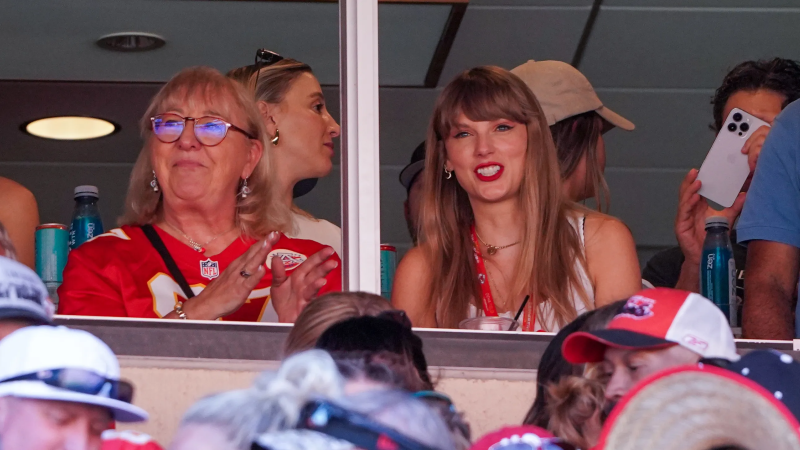The Taylor Swift jokes have turned crude. Have we learned nothing?
The Taylor Swift-Travis Kelce saga was always going to lead us here. First came the early rumors. Then came the hard evidence. Now comes the sexism.
Actress Rachel Zegler called out a Barstool podcast host earlier this week who said he wanted to see a sex tape featuring the rumored couple.
"If Taylor Swift is going to be taking over our Sundays I’m going to need to see a sex tape," host Dan Katz wrote on X, formerly known as Twitter. "These are my demands." Alongside the tweet, he shared a crude discussion about Swift's sex life.
Zegler responded, saying: "It’s not news that the media is particularly (and unwarrantedly) cruel to Taylor Swift but the way men feel entitled to speak about women, their bodies, and their sex lives needs to be seriously evaluated."
Swift and Kelce's relationship is the topic of the moment. You can't escape discussions about it on social media, in group texts, on phone calls with your parents. But that doesn't mean people have a right to make sexist, misogynistic and cruel statements about it – especially when we look back at how female stars like Britney Spears, Amanda Bynes and Jessica Simpson were talked about during the height of their fame.
In recent years, the barrage Spears and her peers faced has been reexamined and criticized, but these comments about Swift show we probably haven't come as far as we'd like to think.

#MeToo and how not everyone learned their lesson
Amid the #MeToo movement, the media, too, faced a reckoning of how it focused its attention on female celebrities.
Experts in gender and pop culture say there's recognition now that there are certain questions which are inappropriate to ask, including whether someone is a virgin – a question Spears, Simpson and other teen stars repeatedly faced.
"People look back and they want to sort of point fingers and blame, acting as though they would have known better at the time, which they wouldn't have, because it was the time. Those were the types of questions that were asked," Kristin Lieb, author of "Gender, Branding, and The Modern Music Industry: The Social Construction of Female Popular Music Stars," previously told USA TODAY. "Are they horrifying? Absolutely. Did most of us recognize them as horrifying? Some did and some didn't. Now we're much better at knowing where those lines are."
But if these comments this week about Swift show us anything, it's that female celebrities are still on the front lines of the nation's culture wars, balancing their own aspirations with their audience's desires and society's expectations. They are trying to navigate success in a culture that still demands access to their bodies and in many cases their private lives.
"In some ways, absolutely it's better. In other ways, it's perhaps worse," Allison Yarrow, author of "90s Bitch: Media, Culture, and the Failed Promise of Gender Equality," previously explained.
The videos don't lie:Ashton Kutcher's cringey clips, Danny Masterson and what our friendships say about us
In fact, a 2017 report from the Pew Research Center found women are about twice as likely as men to say they have been targeted online as a result of their gender.
Taylor Swift and lingering misogyny
When a star is photographed and in public, like taking in a football game, we feel like we are getting an unvarnished look into their lives.
"It reminds us that they're ordinary people too," Erica Chito Childs, a professor of sociology at Hunter College and The Graduate Center, CUNY, previously told USA TODAY.
Most celebrities and public figures have millions of followers on Twitter, Instagram and TikTok, platforms which allow them to tell their stories in unadulterated ways – or, at the very least, better control their messages.
Swift herself plays into this celebrity culture, constantly dropping Easter eggs for fans to guess clues at which re-recording she'll release next or what surprise songs she'll play at her next stop on the Eras tour.
That doesn't mean it gives us license to endlessly speculate about A-listers' relationships to the point of misogyny.
"Most of the time as fans we feel good when the celebrities we like do well – just like supporting the winning football team," W. Keith Campbell, an expert on narcissism, personality, and cultural change, previously told USA TODAY. "But sometimes we can boost our self-esteem by putting celebrities down."
In case you missed:Ben Affleck's face, Reese Witherspoon and Ashton Kutcher's awkwardness and never-ending gossip
'We just see whatever we want'
As soon as we begin to objectify real people, "we completely remove the individual's personality, their true selves," Carla Manly, a clinical psychologist and author of “Joy from Fear," previously told USA TODAY. "We don't know what their fears are, what their hopes are, what their dreams are, what their sadness is. We just see whatever we want."
Experts say it's a useful cultural exercise to think critically about the ways in which the public let many female celebrities down. But these reflections are just the start.
When it comes to celebrity culture, "our desire and hunger for it never ends," Chito Childs said. But people are better off focusing their energy on positive rather than negative messaging.
In other words, in the case of Swift, focus on her songs and not the intimate details of her sex life.
To quote one of her songs, after all: If she were a man, every conquest she had made would make her more of a boss to you.
Contributing: Jenna Ryu, Hannah Yasharoff and Alia Dastagir
Important:Travis Kelce's ex, Taylor Swift and when we call someone a 'girl's girl'

Disclaimer: The copyright of this article belongs to the original author. Reposting this article is solely for the purpose of information dissemination and does not constitute any investment advice. If there is any infringement, please contact us immediately. We will make corrections or deletions as necessary. Thank you.







